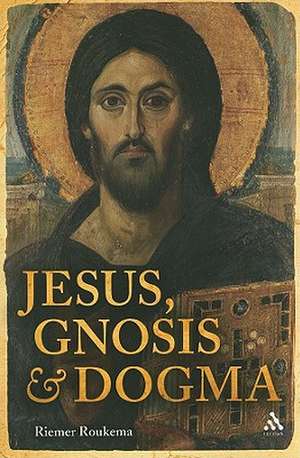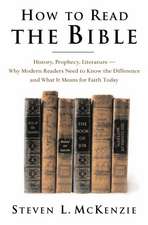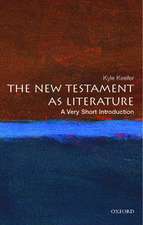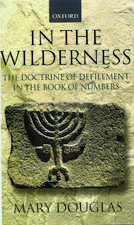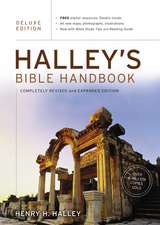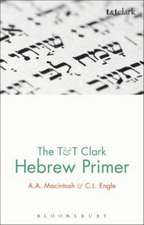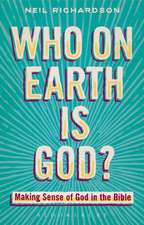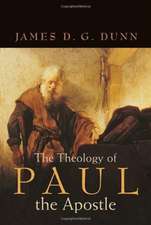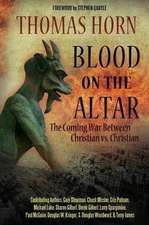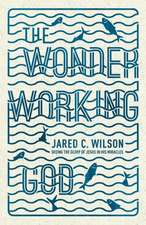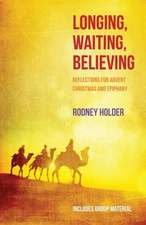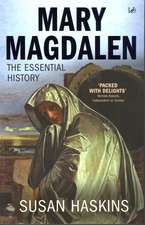Jesus, Gnosis and Dogma
Autor Riemer Roukema Traducere de Saskia Deventer-Metzen Limba Engleză Paperback – 17 feb 2010
In Jesus, Gnosis and Dogma Roukema investigates and assesses the various views of Jesus in early Christianity, basing his approach on a distinction between historical and theological statements about Jesus. Historical statements can be arrived at through a critical study of the earliest records, although Roukema recognizes that scholars differ widely here. Theological statements about Jesus are to do with what has been and is believed about him.
Roukema demonstrates that Gnostic traditions about Jesus mostly derive from the earlier traditions preserved in the New Testament writings and do not give a more accurate view of the historical Jesus. He shows that the view of Jesus as the divine Lord (Yahweh) and Son of God is inspired by an early Jewish pattern that was exploited by the very first Christians. In spite of some later dogmatic precisions, there is more continuity between the New Testament picture of Jesus and the Nicene creed than between the historical Jesus and the Jesus of early Gnosticism. Even the essence of the Trinitarian dogma appears to have Jewish roots.| Toate formatele și edițiile | Preț | Express |
|---|---|---|
| Paperback (1) | 179.56 lei 3-5 săpt. | |
| Bloomsbury Publishing – 17 feb 2010 | 179.56 lei 3-5 săpt. | |
| Hardback (1) | 598.35 lei 6-8 săpt. | |
| Bloomsbury Publishing – 17 feb 2010 | 598.35 lei 6-8 săpt. |
Preț: 179.56 lei
Preț vechi: 207.48 lei
-13% Nou
Puncte Express: 269
Preț estimativ în valută:
34.36€ • 35.80$ • 28.45£
34.36€ • 35.80$ • 28.45£
Carte disponibilă
Livrare economică 13-27 martie
Preluare comenzi: 021 569.72.76
Specificații
ISBN-13: 9780567466426
ISBN-10: 0567466426
Pagini: 256
Dimensiuni: 156 x 234 x 18 mm
Greutate: 0.39 kg
Editura: Bloomsbury Publishing
Colecția T&T Clark
Locul publicării:London, United Kingdom
ISBN-10: 0567466426
Pagini: 256
Dimensiuni: 156 x 234 x 18 mm
Greutate: 0.39 kg
Editura: Bloomsbury Publishing
Colecția T&T Clark
Locul publicării:London, United Kingdom
Descriere
Historical statements about Jesus can be arrived at through a careful and critical study of the earliest records. The author sets out to investigate and assess the various views of Jesus in early Christianity, basing his approach on a distinction between historical and theological statements about Jesus.
Caracteristici
Sets out to investigate the various views of Jesus in early Christianity, with a focus on the distinction between historical and theological statements about Jesus.
Cuprins
1. Introduction
Jesus as a source of inspiration
Jesus considered historically and theologically
Who is Jesus? Reactions by Peter, Matthew, and Thomas
Plan of this book
2. Jesus' origin and identity
Paul's epistles
The Gospel of Mark
The Gospel of Matthew
The Gospel of Luke
The Gospel of John
Evaluation of the New Testament data
The Gospel of Thomas
Cerinthus and the Ophites
The Gospel of Judas
Theodotus
The Tripartite Tractate
Comparison between the New Testament and other writings
3. Jesus' teachings
The Gospel of Mark
The Gospel of Matthew
The Gospel of Luke
The Gospel of John
Evaluation of the New Testament data
The Gospel of Thomas
The Gospel of Judas
The Gospel of Mary
The Tripartite Tractate
Other teachings of Jesus after his death and resurrection
Comparison between the New Testament and other writings
4. Jesus' death, resurrection, and exaltation
Paul's epistles
The Gospel of Mark
The Gospel of Matthew
The Gospel of Luke
The Gospel of John
Evaluation of the New Testament data
The Gospel of Thomas
Cerinthus and the Ophites
The Gospel of Judas
Theodotus
The Tripartite Tractate
A tradition about Simon of Cyrene
Comparison between the New Testament and other writings
5. Preliminary conclusions and new questions
Preliminary conclusions
New questions
6. Jewish Christianity
Patristic testimonies about Jewish Christians
The Pseudo-Clementine writings
An ancient Christian tradition?
Conclusion
7. Did Jesus have secret teachings?
Jesus' unwritten teachings in the 'catholic' Church
Private teachings in the synoptic Gospels
Private teachings in the Gospel of John
Still secret teachings?
Conclusion
8. Does Jesus as LORD and Son of God fit in with early Judaism?
The Old Testament
Philo of Alexandria
Other early Jewish writings
Conclusion
9. Jesus and the Trinitarian dogma
God the Father, the Son and the Holy Spirit in the New Testament
The Father, the Son and the Holy Spirit in Gnostic writings
Some Church Fathers of the second century
Adoptianism
Modalism T
ertullian of Carthage
Origen of Alexandria
Arius
The council of Nicea
Conclusion
10. Conclusions and evaluation
Bibliography
Indices: Bible, some other early Christian writings, names and themes
Jesus as a source of inspiration
Jesus considered historically and theologically
Who is Jesus? Reactions by Peter, Matthew, and Thomas
Plan of this book
2. Jesus' origin and identity
Paul's epistles
The Gospel of Mark
The Gospel of Matthew
The Gospel of Luke
The Gospel of John
Evaluation of the New Testament data
The Gospel of Thomas
Cerinthus and the Ophites
The Gospel of Judas
Theodotus
The Tripartite Tractate
Comparison between the New Testament and other writings
3. Jesus' teachings
The Gospel of Mark
The Gospel of Matthew
The Gospel of Luke
The Gospel of John
Evaluation of the New Testament data
The Gospel of Thomas
The Gospel of Judas
The Gospel of Mary
The Tripartite Tractate
Other teachings of Jesus after his death and resurrection
Comparison between the New Testament and other writings
4. Jesus' death, resurrection, and exaltation
Paul's epistles
The Gospel of Mark
The Gospel of Matthew
The Gospel of Luke
The Gospel of John
Evaluation of the New Testament data
The Gospel of Thomas
Cerinthus and the Ophites
The Gospel of Judas
Theodotus
The Tripartite Tractate
A tradition about Simon of Cyrene
Comparison between the New Testament and other writings
5. Preliminary conclusions and new questions
Preliminary conclusions
New questions
6. Jewish Christianity
Patristic testimonies about Jewish Christians
The Pseudo-Clementine writings
An ancient Christian tradition?
Conclusion
7. Did Jesus have secret teachings?
Jesus' unwritten teachings in the 'catholic' Church
Private teachings in the synoptic Gospels
Private teachings in the Gospel of John
Still secret teachings?
Conclusion
8. Does Jesus as LORD and Son of God fit in with early Judaism?
The Old Testament
Philo of Alexandria
Other early Jewish writings
Conclusion
9. Jesus and the Trinitarian dogma
God the Father, the Son and the Holy Spirit in the New Testament
The Father, the Son and the Holy Spirit in Gnostic writings
Some Church Fathers of the second century
Adoptianism
Modalism T
ertullian of Carthage
Origen of Alexandria
Arius
The council of Nicea
Conclusion
10. Conclusions and evaluation
Bibliography
Indices: Bible, some other early Christian writings, names and themes
Recenzii
'The author is very well acqainted with gnostic literature, and manages to present a complex matter in a comprehensible way and at the same time to make his point: orthodox Christianity has a solid historical basis, and the gnostic variant is secondary.' - Gie Vleugels, Evangelical Theological Faculty, Louvain, Belgium
'This book covers both the New Testament and early Church history. The author appears to be an expert in both disciplines. This implies that the reader can trust to be expertly introduced into ancient gnostic texts like the Gospel of Thomas, the Gospel of Judas, the Gospel of Mary, Theodotus, Cerinthus, the Ophites and the Tripartite Tractate. Furthermore, he learns about Jewish Christian ideas from the beginning of Christianity such as those of the Ebionites, the Nazaraeans and the slightly later views of groups from Syria according to the Pseudo-clementine writings. ... I am convinced that this is a solid book for someone who wants to form a well founded opinion about Jesus.' - Huub van de Sandt, Faculty of Humanities, University of Tilburg, The Netherlands
'Roukema offers a wide-ranging survey of early Christian texts, focusing on how they treat Jesus. His discussion is informed, up to date in engagement with other scholars, and offers sensible judgements on all the issues he addresses. Roukema makes clear his own sympathy with traditional Christian faith, but his handling of other positions is fair and accurate. The scope of evidence considered and the qualify of his analysis combine to make this a valuable study.' - Larry W. Hurtado, School of Divinity, University of Edinburgh, UK
'This is an ambitious attempt to compare the New Testament presentations of Jesus' identity, teaching, death, resurrection and exaltation, with the equivalent Gnostic presentations which have received so much attention in recent years, both scholarly and novelistic. It shows well how different was the former from the latter and goes on to examine the question whether Jesus gave secret teaching, and the development of Christianity's high christology within the context of early Judaism and in the debates of patristic Christianity. The impressive treatment sticks closely to the texts examined and makes clear why mainstream Christianity's evaluation of Jesus both moved on from the early Jewish Christian version and rejected the Gnostic alternatives. As a concise overview it will be a boon to many students and to those who do not have sufficient time to immerse themselves in the wide range of literature examined.' - James D.G. Dunn, Department of Theology and Religion, Durham University, UK.
"Roukema presents convincing arguments ... [and] helpfully distinguishes historical inquiries from theological ones." Methodist Recorder, 24th June 2010
'Roukema operates with a distinction between what can be said about Jesus historically (on the basis of the oldest sources) and theologically (the faith or unbelief of the reader).' 'This book is relevant for our time ... and very useful for students and church leaders' Baptist Times
'There is much to commend this book... It certainly deserves to be read along with the more sceptical texts of the various quests for the 'historical Jesus' and provides a helpful counter balance to their received wisdom.'
Roukema's book is a translation from the Dutch. He is interested in determining which are the earliest documents and which are the most reliable in reflecting the life and teaching of Jesus. He distinguishes between the work of the hiustorian and the theologian. Roukema does come down on the side of more traditionel views but this arguments are good. - Donald A Bullen - Liverpool Hope University
'A useful book and one that raises important issues for debate.'
'Would be especially effective in an introductory to New Testament class as a supplemental reading... Any scholar would know this material, but such material has not been made as accessible to the general public until Jesus, Gnosis, and Dogma.'
This book may be useful to students in a conservative theological setting coming to the historical study of Christology for the first time, since it will begin to introduce a number of key concepts and issues, without overwhelming them with challenging material and perspectives at their first encounter.
Reviewed in French in Revue d'Histoire et de Philosophie Religieuses.
'This book covers both the New Testament and early Church history. The author appears to be an expert in both disciplines. This implies that the reader can trust to be expertly introduced into ancient gnostic texts like the Gospel of Thomas, the Gospel of Judas, the Gospel of Mary, Theodotus, Cerinthus, the Ophites and the Tripartite Tractate. Furthermore, he learns about Jewish Christian ideas from the beginning of Christianity such as those of the Ebionites, the Nazaraeans and the slightly later views of groups from Syria according to the Pseudo-clementine writings. ... I am convinced that this is a solid book for someone who wants to form a well founded opinion about Jesus.' - Huub van de Sandt, Faculty of Humanities, University of Tilburg, The Netherlands
'Roukema offers a wide-ranging survey of early Christian texts, focusing on how they treat Jesus. His discussion is informed, up to date in engagement with other scholars, and offers sensible judgements on all the issues he addresses. Roukema makes clear his own sympathy with traditional Christian faith, but his handling of other positions is fair and accurate. The scope of evidence considered and the qualify of his analysis combine to make this a valuable study.' - Larry W. Hurtado, School of Divinity, University of Edinburgh, UK
'This is an ambitious attempt to compare the New Testament presentations of Jesus' identity, teaching, death, resurrection and exaltation, with the equivalent Gnostic presentations which have received so much attention in recent years, both scholarly and novelistic. It shows well how different was the former from the latter and goes on to examine the question whether Jesus gave secret teaching, and the development of Christianity's high christology within the context of early Judaism and in the debates of patristic Christianity. The impressive treatment sticks closely to the texts examined and makes clear why mainstream Christianity's evaluation of Jesus both moved on from the early Jewish Christian version and rejected the Gnostic alternatives. As a concise overview it will be a boon to many students and to those who do not have sufficient time to immerse themselves in the wide range of literature examined.' - James D.G. Dunn, Department of Theology and Religion, Durham University, UK.
"Roukema presents convincing arguments ... [and] helpfully distinguishes historical inquiries from theological ones." Methodist Recorder, 24th June 2010
'Roukema operates with a distinction between what can be said about Jesus historically (on the basis of the oldest sources) and theologically (the faith or unbelief of the reader).' 'This book is relevant for our time ... and very useful for students and church leaders' Baptist Times
'There is much to commend this book... It certainly deserves to be read along with the more sceptical texts of the various quests for the 'historical Jesus' and provides a helpful counter balance to their received wisdom.'
Roukema's book is a translation from the Dutch. He is interested in determining which are the earliest documents and which are the most reliable in reflecting the life and teaching of Jesus. He distinguishes between the work of the hiustorian and the theologian. Roukema does come down on the side of more traditionel views but this arguments are good. - Donald A Bullen - Liverpool Hope University
'A useful book and one that raises important issues for debate.'
'Would be especially effective in an introductory to New Testament class as a supplemental reading... Any scholar would know this material, but such material has not been made as accessible to the general public until Jesus, Gnosis, and Dogma.'
This book may be useful to students in a conservative theological setting coming to the historical study of Christology for the first time, since it will begin to introduce a number of key concepts and issues, without overwhelming them with challenging material and perspectives at their first encounter.
Reviewed in French in Revue d'Histoire et de Philosophie Religieuses.
